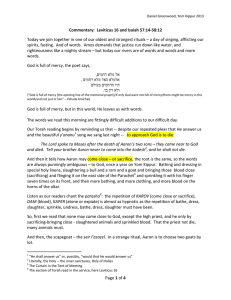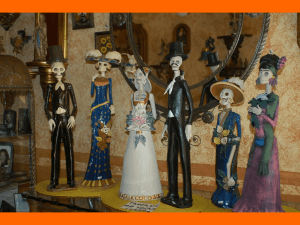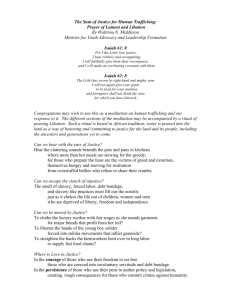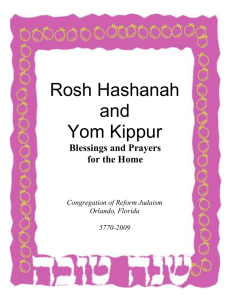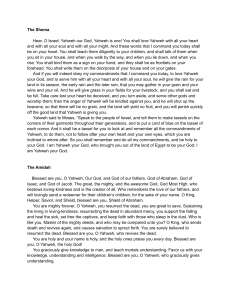Often, the role of the parashan is to smooth out... things that might seem disturbing really aren’t.
advertisement
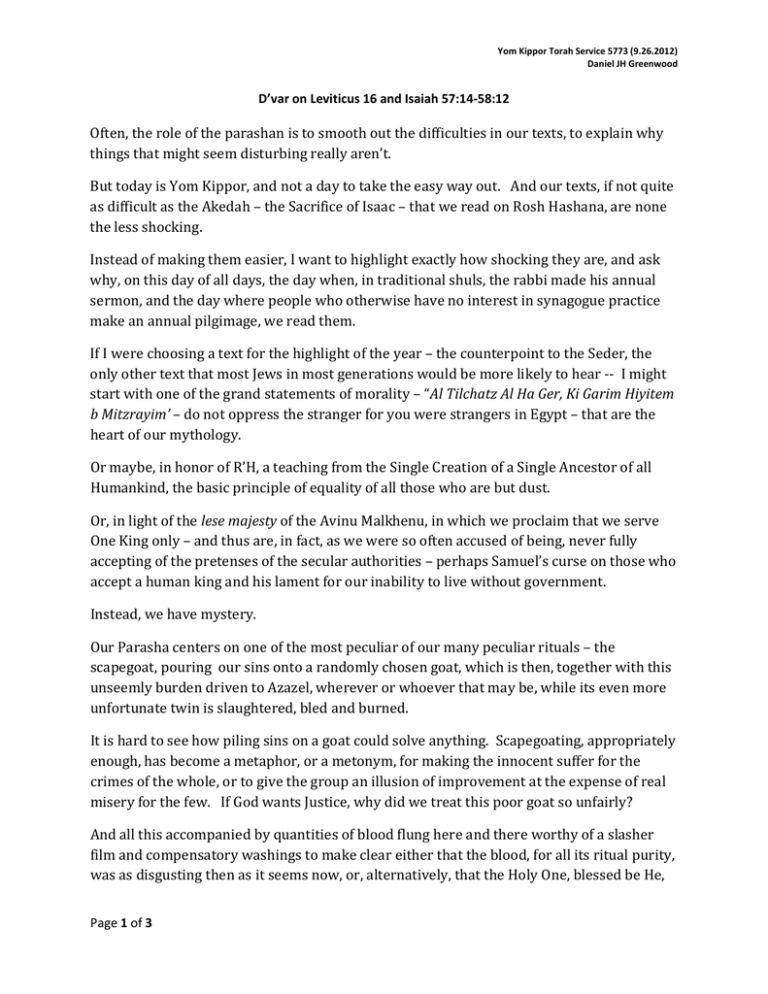
Yom Kippor Torah Service 5773 (9.26.2012) Daniel JH Greenwood D’var on Leviticus 16 and Isaiah 57:14-58:12 Often, the role of the parashan is to smooth out the difficulties in our texts, to explain why things that might seem disturbing really aren’t. But today is Yom Kippor, and not a day to take the easy way out. And our texts, if not quite as difficult as the Akedah – the Sacrifice of Isaac – that we read on Rosh Hashana, are none the less shocking. Instead of making them easier, I want to highlight exactly how shocking they are, and ask why, on this day of all days, the day when, in traditional shuls, the rabbi made his annual sermon, and the day where people who otherwise have no interest in synagogue practice make an annual pilgimage, we read them. If I were choosing a text for the highlight of the year – the counterpoint to the Seder, the only other text that most Jews in most generations would be more likely to hear -- I might start with one of the grand statements of morality – “Al Tilchatz Al Ha Ger, Ki Garim Hiyitem b Mitzrayim’ – do not oppress the stranger for you were strangers in Egypt – that are the heart of our mythology. Or maybe, in honor of R’H, a teaching from the Single Creation of a Single Ancestor of all Humankind, the basic principle of equality of all those who are but dust. Or, in light of the lese majesty of the Avinu Malkhenu, in which we proclaim that we serve One King only – and thus are, in fact, as we were so often accused of being, never fully accepting of the pretenses of the secular authorities – perhaps Samuel’s curse on those who accept a human king and his lament for our inability to live without government. Instead, we have mystery. Our Parasha centers on one of the most peculiar of our many peculiar rituals – the scapegoat, pouring our sins onto a randomly chosen goat, which is then, together with this unseemly burden driven to Azazel, wherever or whoever that may be, while its even more unfortunate twin is slaughtered, bled and burned. It is hard to see how piling sins on a goat could solve anything. Scapegoating, appropriately enough, has become a metaphor, or a metonym, for making the innocent suffer for the crimes of the whole, or to give the group an illusion of improvement at the expense of real misery for the few. If God wants Justice, why did we treat this poor goat so unfairly? And all this accompanied by quantities of blood flung here and there worthy of a slasher film and compensatory washings to make clear either that the blood, for all its ritual purity, was as disgusting then as it seems now, or, alternatively, that the Holy One, blessed be He, Page 1 of 3 Yom Kippor Torah Service 5773 (9.26.2012) Daniel JH Greenwood and his earthly representatives, had a significant investment in a laundry service. Or Roman Bath envy. Strange enough. But it gets odder -- our Haftorah culminates in a devastating critique of what we are doing right now: “Is this the fast I wanted – proclaims the Prophet in the name of God – a day for people to starve their bodies? Do you call that a fast, a day when Adonai is favorable – “No, this is the fast I desire – to unlock fetters of wickedness and untie the cords of the yoke, to let the oppressed go free, to break off every yoke. It is to share your bread with the hungry and take the wretched poor into your home, when you see the naked, to clothe them, and do not ignore your own flesh.” Do not, the Prophet says, think that ritual – splashing blood, or bowing your head to the floor, or starving yourself, or even singing the moving tunes that Joey leads us in – Do not think that our rituals will move God, says Isaiah. Today, more than ever, God wants Justice, not ritual. I don’t want to make too much sense of this. Judaism is a religion of contrasts and demands, of challenging more than comforting. Our rituals are ancient and often inexplicable. Our teachings are often paradoxical, and especially so on this most holy day of a fast of which our God does not approve, -in which we call out to He who is not seen, ne’elam v gam ayn sof l’ achduto – vanished, and also His solitude is infinite-- as we say in the Yigdal, -who perhaps would answer the one thing I ask – echad shalti, if only I believed, as we read in Psalm 27 at the end of the service, but speaks only to Moshe, who is maley rahamim, full of mercy, but made us like a passing shadow, K’tzel ovair, full of sin maley avon, dust and ashes, afar v’ efer. If God were not full of mercy, as Amichai said, perhaps there would be some mercy in this world as well. This much, however, is clear enough. Our Parasha begins with a short reference to the mysterious episode in which, for reasons unexplained, Aaron’s sons were killed: --שׁנֵי ְבּנֵי אַהֲר ֹן ְ , אַח ֲֵרי מוֹת,מֹשֶׁה- אֶל,◌ַ י ְדַ בֵּר י ְהוָה ַויָּמֻתוּ,י ְהוָה- ְבּק ְָרבָתָ ם ִל ְפנֵי. And Adonai spoke to Moses, after the death of Aaron’s two sons when they came close to Adonai and they died. Page 2 of 3 Yom Kippor Torah Service 5773 (9.26.2012) Daniel JH Greenwood In the original telling, they died because they brought strange fire to the Altar, which is strange enough. But our summary leaves even that out – “in their coming close before Adonai, they died. “ Why do we start here? God, it seems, is dangerous. Do not get too close, for that way leads to the near death of the son of Abraham at his father’s hand; that way leads to the death of the sons of Aaron; that way leads to the killing of innocent goats and the fast of which God does not approve. Ritual, Isaiah tells us, is no substitute for justice. Judaism, above all else, condemns idolatry – the sin of setting up our creations as masters of ourselves and worshipping them, whether the psalim (the idols) be sacred land, or nation states, or free markets, or corporations or Art or science. Or even, the Isaiah and the blood of Aaron’s sons cry out to us, Religion itself. In the end, our texts are telling us, we must take responsibility, for God has given us but one world and if we destroy it, there is no other. In this world of the silent God, we must do His work, for if not us, then whom? Page 3 of 3
